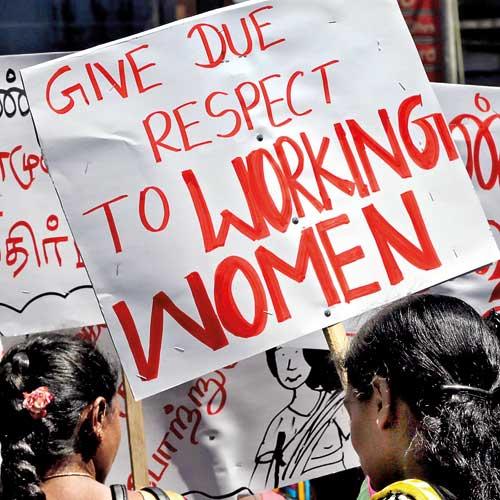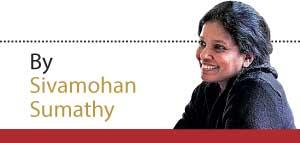Reply To:
Name - Reply Comment
Last Updated : 2024-04-26 22:10:00
Anxieties of a nation and the anxieties of capital
The Budget of 2021:Pre-COVID preoccupations
The budget comes at a critical time. It is the first budget in the time of the current President and the government that was voted in August 2020, and also the budget that spells out the government’s programme in the days of the COVID and after.
Many groups and critics have pointed out that the budget has not provided for the people, their safety and survival. The provisions have little to say about catering to middle-class white-collar workers either. Education, one of the cornerstones of any budget proposal, is indifferently treated; the substantial education programme is seen as one of technology, modality, and not one of substance. It has sidestepped safety and health concerns of children and staff. Instead, they are treated as expendable commodities.
The hardest hit by COVID 19 are the working people. The first wave brought a lot of concern for those without work and rendered destitute, but the scale of disempowerment in the second wave has left all concerned aghast and helpless. An editorial of Daily Mirror has the trade union leader Linus Jayatilleke quoting astounding figures of people who had been furloughed, stranded, and left out in the cold. (dailymirror.lk/opinion/Covid-budget-and-the-common-man-EDITORIAL/172-2).
 In not attending to the urgency of the situation in its budget proposals, the government has demonstrated how disengaged it is from the political realities of class.
In not attending to the urgency of the situation in its budget proposals, the government has demonstrated how disengaged it is from the political realities of class.
A close study of the preamble by the Prime Minister shows that the proposals and expenditure are built around an unrealistic projection of economic growth for next year, giving one the impression that the budget was drawn up in pre-COVID times; totally unheeding of the realities of COVID 19 and our future after it. As the Collective for Economic Democracy says: economic projection in the years to come would be negative growth not just in Sri Lanka, but for most of the world. Yet, the government proposes a few meagre relief measures thrown in here and there, less than inadequate, and not in areas where they are most needed, such as food, health, safety, and security of work. Instead of conserving the strengths of the country’s resources, such as land, agriculture, fisheries and supporting the labour of the people, the government’s budget focuses on construction, investment and digitalization of education, all of which are under great strain and designed to further distance people from the centres of power and the capitalist classes. (http://www.ft.lk/business/Budget-2021-Economic-depression-and-the-Government-s-empty-response/34-709256. Thousands go out of work, in the organized informal sectors in urban areas. With exports and investments down, and with tourism grinding to a standstill, the informal sectors in the urban areas are going to be at the receiving end of the calamity that is waiting around the corner. Yet, the government proposes investments, construction, mega, major and minor, consumption, and entrepreneurship.
The Gender of Budget 2021
Let’s turn to the budget’s “gender”. A close read and an economic analysis of the disempowerment of women and women’s labour in the budget is a must. But even as we do it, we may want to look at the ideological framework of the budget. Entrepreneurship is understood as a panacea for the ills of the economic downslide. Unlike mega construction, entrepreneurship here alludes to the empowerment of the youth; a twin programme of spending that the country needs to revive economic activity, and a building of the economy of the people, through production.
The terms on which entrepreneurship is offered to the youth is through an individualised loan scheme. The fact that entrepreneurship is offered to the youth at a time entrepreneurship itself is under stress, points to one, that the government has no thought-out plan for the rebuilding of the economy in the hinterland of the country and outside the big urban centres, and two, that entrepreneurship at the expense of planning will lead people, as it has done in the past, to exorbitant levels of indebtedness.
The budget misrecognizes women’s labour as youth entrepreneurship
Entrepreneurship, where it has concerned women and targeted women, outside of commercial and bourgeois settings, had been about coaxing women on the peripheries into a market economy (entrepreneurship) that was already fragile. Entrepreneurship has at best remained small and heavily subsidised either by the government or NGOs; by and large, economically unviable. Sulari de Silva’s ongoing work on the weaving industries and entrepreneurship reveals that it is the labour of the crafts-people, largely women, that has been integrated into the peripheries of a capitalist economy, and not entrepreneurship (Dumbara Weaving; The Production of Craft Textiles in the Capitalist Periphery). To me she says, “with no yarn available now, the major outlets that commission and buy these products on a daily wage basis, or a product basis, have stopped their orders.” It seems that among the returning people to the upcountry from the cities, thrown out of work, women are the ones who are finding it most difficult to eke out a living. Entrepreneurship is not one wants at a time of austerity, but care, security, and welfare provisions.
Proposing entrepreneurship as an antidote to employment within a set up where employment opportunities are shrinking is a fraudulent move. Further, in not providing for the large numbers of women and men, who have been thrown out of work, entrepreneurship becomes a camouflage for the failure of this budget proposal to even begin to understand the problem. The framework in which youth and entrepreneurship are brought together is designed to increase indebtedness, among the people. Instead of providing the much-needed relief and security to working people and those thrown out of work, the government is offering loans on interest where they are not viable.
"In not attending to the urgency of the situation in its budget proposals, the government has demonstrated how disengaged it is from the political realities of class"
Ideologically, entrepreneurship built around loans is presented as a seeming alternative to labour. Here, I decidedly read labour as the labour of women: a disproportionate and increasing disenfranchisement of women’s labour in the exigencies of COVID 19. In the north and east, and among Tamil and Muslim women, indebtedness, the scandal of microfinance, and payment commitments toward a house in the numerous housing schemes at hand, has had women in a stranglehold, struggling with families and social cohesion. Activists working with women’s groups, co-operatives and thrift societies tell me that with increasing dislocation of labour, and security, like lack of a house, and the lack of work for men and women alike, women’s activism around the class and economic concerns are taking centre stage. Yet, there is no recognition of the siege that women are in today and the strength that women have demonstrated all these years in times of adversity.
Vistas of Splendour and Prosperity: Is the government losing the plot?
The budget proposals are formulated and trapped within a Neo-Liberal mindset. Women’s lobbies, women’s movement and economic analyses have to look sharply at the ideological currents that inform all policy and have an engaged response to economic programmes; in which the concerns, perspectives and strengths garnered from women’s work provide the basis for analysis and not a middle-class normativity, built on assessments of individual women’s rate of success and failure. Budget 2021 arriving at this critical moment of women’s history should alert us to how we may proceed.
The lie that the promise of entrepreneurship is, therein lies the erasure of women’s labour, men’s labour and labour as a whole. In short, a class analysis. Anxious masculinity and a nervous nation lurk within the folds of this slippage. We have to resuscitate a class analysis of gender and a gendered approach to class, that is also attendant to the genders of the nation. As women’s groups push forward with their challenge, they may need to redraw the contours of their activism.

Add comment
Comments will be edited (grammar, spelling and slang) and authorized at the discretion of Daily Mirror online. The website also has the right not to publish selected comments.
Reply To:
Name - Reply Comment
US authorities are currently reviewing the manifest of every cargo aboard MV
On March 26, a couple arriving from Thailand was arrested with 88 live animal
According to villagers from Naula-Moragolla out of 105 families 80 can afford
Is the situation in Sri Lanka so grim that locals harbour hope that they coul

5 hours ago
6 hours ago